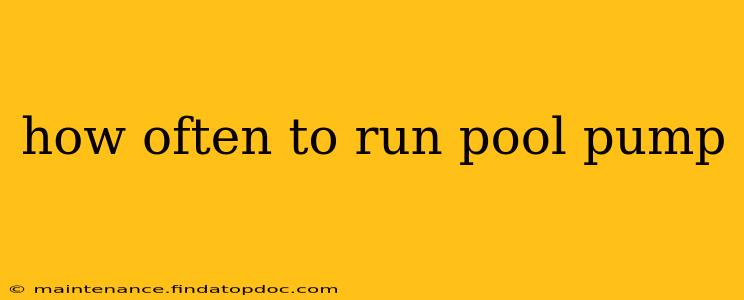Keeping your swimming pool sparkling clean and healthy requires a well-maintained filtration system. The heart of that system? Your pool pump. But how often should you actually run it? There's no one-size-fits-all answer, as the ideal run time depends on several factors. This guide will delve into the specifics, helping you determine the perfect pump schedule for your pool.
What Factors Influence Pool Pump Run Time?
Several key elements impact how long your pool pump needs to run:
- Pool Size: Larger pools naturally require longer filtration cycles than smaller ones. More water means more time to thoroughly filter and circulate.
- Pool Type: In-ground pools, with their larger volumes, typically demand longer pump run times compared to above-ground pools.
- Climate: Hotter climates lead to faster algae growth and increased debris accumulation, necessitating more frequent pumping. Conversely, cooler climates may allow for slightly shorter run times.
- Number of Swimmers: Higher swimmer usage increases the amount of contaminants entering the pool, requiring more frequent filtering.
- Filter Type: Different filter types (sand, cartridge, DE) have varying cleaning cycles and efficiency levels. Some may require more frequent operation to maintain optimal performance.
- Water Chemistry: Properly balanced water chemistry inhibits algae and bacteria growth, reducing the overall filtration burden and potentially allowing for shorter run times.
How Many Hours a Day Should My Pool Pump Run?
A general guideline is to run your pool pump for 8-12 hours a day. This is often sufficient for most pools to maintain adequate water circulation and filtration. However, this is simply a starting point. You may need to adjust this based on the factors listed above.
What Happens if I Run My Pool Pump Too Little?
Insufficient pump run time leads to several problems:
- Algae Growth: Poor circulation allows algae to thrive, turning your pool green and potentially creating a breeding ground for harmful bacteria.
- Cloudy Water: Lack of proper filtration results in cloudy or murky water, impacting the aesthetic appeal and potentially posing health risks.
- Chemical Imbalances: Inadequate circulation hinders the distribution of pool chemicals, making it difficult to maintain a balanced water environment.
- Reduced Filter Efficiency: Lack of regular cleaning can clog the filter, reducing its effectiveness and forcing you to run the pump for longer periods to achieve the same level of filtration.
What Happens if I Run My Pool Pump Too Much?
While running your pump more isn't inherently harmful, it can lead to some downsides:
- Higher Energy Bills: Excessive run time increases electricity consumption, leading to higher energy costs.
- Premature Equipment Wear: Constantly running the pump puts extra stress on its components, potentially shortening its lifespan.
- Unnecessary Water Heating: In warmer climates, running the pump for extended periods can increase water temperature, making it less comfortable for swimming.
How Can I Determine the Optimal Run Time for My Pool?
The best way to determine the ideal pump run time for your specific pool is through observation and adjustment. Start with the 8-12 hour guideline and monitor your water clarity and chemistry. If you notice algae growth or cloudy water, increase the run time. If the water remains clear and the chemicals are balanced, you may be able to reduce the run time slightly to save energy. Consider using a timer to automate your pump's operation.
Should I run my pool pump at night?
Running your pool pump at night is often recommended for several reasons: electricity rates are frequently lower during off-peak hours, reducing your energy costs. Also, the sun's heat has less impact on water temperature at night.
How do I know if my pool pump is working properly?
A properly functioning pool pump should circulate water smoothly, maintaining clear and balanced water. Look for consistent water flow through the returns and listen for any unusual noises. Regular maintenance, including filter cleaning, will help ensure your pump's longevity and optimal performance.
This comprehensive guide provides a solid foundation for determining the optimal run time for your pool pump. Remember to adjust your schedule based on your specific circumstances and always monitor your water quality. By following these guidelines, you can ensure a clean, healthy, and enjoyable swimming experience throughout the season.
